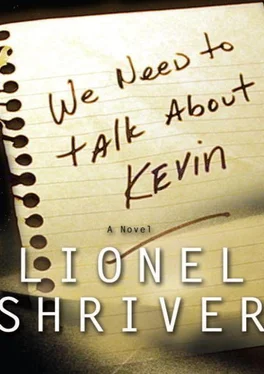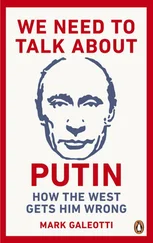I’m not sure what led me to go in there. I’d stayed home from AWAP to take Celia in for another oculist appointment, to check on her adaptation to the prosthesis. There was little enough in Kevin’s room to attract curiosity, though it may have been this very quality—its mysterious blankness—that I found so magnetic. When I creaked open the door I felt powerfully that I wasn’t meant to be there. Kevin was in school, you were scouting, Celia was poring over homework that should have taken her ten minutes and would therefore take her a good two hours, so the chances of my being discovered were slim. Still, my heart raced and my breath was bated. This is silly, I told myself. I’m in my own house, and if improbably interrupted I can claim to be checking for dirty dishes.
Fat chance, in that room. It was immaculate; you teased Kevin about being a “granny,” he was such a neatnik. The bed was made with bootcamp precision. We’d offered him a bedspread of racing cars or Dungeons and Dragons; he’d been quite firm on preferring plain beige. The walls were unadorned; no posters of Oasis or the Spice Girls, no leering Marilyn Manson. The shelves lay largely bare: a few textbooks, a single copy of Robin Hood ; the many books we gave him for Christmas and birthdays simply disappeared. He had his own TV and stereo system, but about the only “music” I’d heard him play was some kind of Philip Glass-like CD that sequenced computer-generated phrases according to a set mathematical equation; it had no form, no peaks or valleys, and approximated the white noise that he would also tune in on the television when he was not watching the Weather Channel. Again, the CDs we’d given him when trying to sort out what he “liked” were nowhere in evidence. Though you could get delightful screen savers of leaping dolphins or zooming spaceships, the one on his Gateway merely pointillated random dots.
Was this what it looked like inside his head? Or was the room, too, a kind of screen saver? Just add a seascape above the bed, and it looked like an unoccupied unit at a Quality Inn. Not a photograph at his bedside, nor keepsake on his bureau—the surfaces were slick and absent. How much I’d have preferred to walk into a hellhole jangling with heavy-metal, lurid with Playboy centerfolds, fetid from muddy sweats, and crusty with year-old tuna sandwiches. That was the kind of no-go teen lair that I understood, where I might discover safe, accessible secrets like a worn Durex packet under the socks or a baggie of cannabis stuffed in the toe of a smelly sneaker. By contrast, the secrets of this room were all about what I would not find, like some trace of my son. Looking around, I thought uneasily, He could be anyone.
But as for its conceit that there was nothing to hide, I wasn’t buying. So when I spotted a stack of floppies on the shelf above the computer, I shuttled through them. Inscribed with characterless perfect printing, their titles were obscure: “Nostradamus,” “I Love You,” “D4-X.” Feeling wicked, I picked one of them out, put the rest back the way I found them, and slipped out the door.
In my study, I inserted the floppy in my computer. I didn’t recognize the suffixes on the A drive, but they weren’t regular word-processing files, which disappointed me. In hoping to find a private journal or diary, I may have been less eager to discover the precise content of his inmost thoughts than to confirm that at least he had inmost thoughts. Not about to give up easily, I went into the Explorer program and loaded one of the files; perplexingly, Microsoft Outlook Express came up on screen, at which point Celia called from the dining table that she needed help. I was gone for about fifteen minutes.
When I returned, the computer was blank. It had shut itself off, which it had never done without being told. Disconcerted, I turned it on again but got nothing but error messages, even when I took the disk from the drive.
You’re way ahead of me. I carted the thing into work the next day so that my technical people might sort it out, only to discover the entire office milling about. It wasn’t exactly pandemonium, more like the atmosphere of a party that had run out of drink. Editors were chatting aimlessly in one another’s cubicles. No one was working. They couldn’t. There wasn’t a terminal functioning. Later I was almost relieved when George informed me that my PC’s hard drive was so corrupted that I might as well buy a new one. Perhaps with the infectious object destroyed, no one would ever know that the virus had been forwarded by AWAP’s own executive director.
Furious at Kevin for keeping the modern equivalent of a pet scorpion, I held onto the disk as evidence for several days rather than discreetly sliding it back on his shelf. But once I simmered down, I had to admit that Kevin hadn’t personally wiped out my company’s files, and the debacle was my fault. So one evening I knocked on his door, was granted admission, and closed it behind me. He was sitting at the desk. The screen saver was blipping in its desultory fashion, dot here, dot there.
“I wanted to ask you,” I said, tapping his floppy. “What’s this?”
“A virus,” he said brightly. “You didn’t load it in, did you?”
“Of course not,” I said hastily, discovering that lying to a child feels much the same as lying to a parent; my cheeks prickled as they had when I assured my mother after losing my cherry at seventeen that I’d spent the night with a girlfriend she’d never heard of. Mother knew better; Kevin did, too. “I mean,” I revised mournfully, “only once.”
“Only takes once.”
We both knew that it would have been ridiculous for me to have sneaked into his room and stolen a disk, with which I subsequently ruined my computer and paralyzed my office, only to come storming in to accuse him of industrial sabotage. So the interchange proceeded with an evenness.
“Why do you have it?” I asked respectfully.
“I keep a collection.”
“Isn’t that a peculiar thing to collect?”
“I don’t like stamps.”
Just then I had a presentiment of what he might have said had you burst in determined to find out why the heck he had a stack of computer viruses above his desk: Well, after we watched Silence of the Lambs , I decided I wanted to be an FBI agent! And you know how they have this whole task-force that, like, tracks down hackers who spread those terrible computer viruses? So I’m studying them and everything, ’cause I’ve read it’s a really big problem for the new economy and globalization and even for our country’s defense… ! That Kevin skipped such a performance—he collected computer viruses, end of story, so what?—left me feeling strangely flattered.
So I asked bashfully. “How many do you have?”
“Twenty-three.”
“Are they—difficult to find?”
He looked at me gamely, with that old sense of indecision, but on some whim he decided to experiment with talking to his mother. “They’re hard to capture alive ,” he said. “They get away, and they bite. You have to know how to handle them. You know—like a doctor. Who studies diseases in a lab but doesn’t want to get sick himself.”
“You mean, you have to keep them from infecting your own machine.”
“Yeah. Mouse Ferguson’s been teaching me the ropes.”
“Since you collect them. Maybe you can explain to me—why do people make them? I don’t get it. They don’t achieve anything. What’s the appeal?”
“I don’t get,” he said, “what you don’t get.”
“I understand hacking into AT&T to get free phone calls or stealing encrypted credit card numbers to run up a bill at The Gap. But this sort of computer crime—nobody benefits. What’s the point?”
Читать дальше












